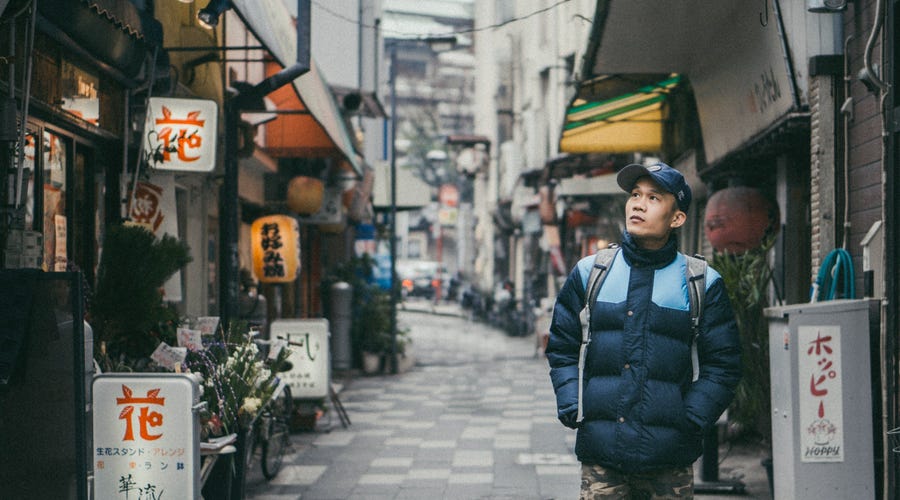
How to say the days of the week in Japanese: A fun & free guide
Author: Mayumi Hikida
Does Japan have the seven-days-per-week system, too? YES!
This means it's not as complicated to remember the days of the week in Japanese as you may think!
Learning them is particularly helpful when communicating in a foreign language; usually, days of the week are easier to pick up than numbers in conversations. Let's say I'm making an appointment at a clinic in Vienna, Austria. The fast-speaker receptionist asks me, "Montag, den dreiundzwanzigsten Oktober?" I could at least understand it's one of the Mondays in October, which would give me a better chance of guessing right. I'd look at my calendar and squeeze out my Baby Deutsch, "Montag... Dreiundzwanzigsten?" (Monday… 23rd?)
Have I succeeded in motivating you to read on?
Table of contents
- Where did it come from?
- How to say and write the days of the week in Japanese
- Good news: easy to remember this way!
- Related words
- Cultural facts
- Use them in sentences
- Days of the week Japanese songs
- Get a Japanese calendar
Where did it come from?
The seven-day-per-week concept was introduced to Japan in the early 9th century. A Buddhist monk brought it back from China, and it was mainly applied to the area of fortunetelling in Japan. It became part of everyday life after Japan officially adopted the Gregorian Calendar in the 19th century.

How to say and write the days of the week in Japanese
Let me first introduce the word '曜日' (ようび - yōbi); it means 'day of the week'. Each day has one unique kanji before '曜日'. Pretty simple, right? The kanji '曜' doesn't look super simple though — can you believe most Japanese kids today learn this complicated letter at the budding age of 7 or 8?
The first kanjis are much less complicated, and this blog post helps you remember the seven 曜日 more easily. I've got your back, friends.
These are the seven days
Yes. I counted. There are seven.
| English | Hiragana | Kanji | Romaji |
| Monday | げつようび | 月曜日 | Getsuyōbi |
| Tuesday | かようび | 火曜日 | Kayōbi |
| Wednesday | すいようび | 水曜日 | Suiyōbi |
| Thursday | もくようび | 木曜日 | Mokuyōbi |
| Friday | きんようび | 金曜日 | Kin’yōbi |
| Saturday | どようび | 土曜日 | Doyōbi |
| Sunday | にちようび | 日曜日 | Nichiyōbi |
Abbreviations
In everyday conversation, we often say '月曜' (getsuyō) instead of '月曜日' (getsuyōbi). Yes, the last '日' (bi) is omitted. One letter shorter. Yay!
In the written format, it can be just a single letter like '月'. If a shop is open from Monday to Friday, the sign on its door or window may say, '月 - 金'.
Japanese date format
In the States, the date format goes like this:
- Monday, October 16, 2023
In British English:
- Monday, 16 October 2023
The Japanese format? Generally, it's in this order: year, month, day, and day of the week. The above date looks like these;
- 2023年10月16日 月曜日
- 2023年10月16日(月)
Sometimes a year is written with a Japanese era name such as '令和5年'. I may write about it some other time if requested, as it'd require an extra 1K words to explain the era name and its history!
Good news: easy to remember this way!
I must've learned how to say the days of the week before starting school. I was utterly fascinated later when I was taught about their association with planets (and a star and a satellite). If you're familiar with the association, this definitely helps you remember how to say and write the seven days. Bonus point: you'll learn the names of some planets (and a star and a satellite) in Japanese, too!
Each kanji preceding '曜日' corresponds to a planet, a star, or a satellite as shown below. (Excuse me for the repetition and my peculiar precision.)
| Day of the week | Planet / Star / Satellite (Japanese) | Planet / Star / Satellite (English) | Note |
| 月曜日 | 月 (つき - tsuki) | Moon | 月 also means ‘month’. (Confusing, I know.) |
| 火曜日 | 火星 (かせい - kasei) | Mars | 火 means ‘fire’. |
| 水曜日 | 水星 (すいせい - suisei) | Mercury | 水 means ‘water’. |
| 木曜日 | 木星 (もくせい - mokusei) | Jupiter | 木 means ‘wood’. |
| 金曜日 | 金星 (きんせい - kinsei) | Venus | 金 means ‘gold’. |
| 土曜日 | 土星 (どせい - dosei) | Saturn | 土 means ‘earth’ (soil). |
| 日曜日 | 太陽 (たいよう - taiyō) | Sun | The first 日 means ‘sun’, and the second 日 means ‘day’. |
Related words
Here's a list of Japanese words associated with 'week'.
| English | Hiragana | Kanji | Romaji |
|---|---|---|---|
| Week | しゅう | 週 | Shū |
| A week | いっしゅうかん | 一週間 | Isshūkan |
| Weekday(s) | へいじつ | 平日 | Heijitsu |
| Weekend | しゅうまつ | 週末 | Shūmatsu |
| National holiday | しゅくじつ | 祝日 | Shukujitsu |
| Holiday | きゅうじつ | 休日 | Kyūjitsu |
| Today | きょう | 今日 | Kyō |
| Tomorrow | あした / あす | 明日 | Ashita / Asu |
| Day after tomorrow | あさって | 明後日 | Asatte |
| Yesterday | きのう | 昨日 | Kinō |
| Day before yesterday | おととい | 一昨日 | Ototoi |
| This week | こんしゅう | 今週 | Konshū |
| Next week | らいしゅう | 来週 | Raishū |
| Last week | せんしゅう | 先週 | Senshū |
| Beginning of the week | しゅうあけ | 週明け | Shūake |
A few words need explanation; let me start with '祝日' (shukujitsu). It's a national holiday, and there are more than a dozen annually. '休日' (kyūjitsu) is a broader term that includes public and personal holidays. If a '祝日' falls on Sunday, the following Monday becomes a public holiday (振替休日 - furikaekyūjitsu), too. You can also call your day off '休日'.
'明日' is commonly pronounced as 'ashita'. 'Asu' is used in more formal contexts, such as news broadcasts.
The word '週明け' might make you wonder, "So, what day is the beginning of the week in Japan?" Excellent question. Read on, the answer is a few scrolls away.
Cultural facts
Now, let's dive deeper into Japanese culture that even the locals might not be aware of.

What day is the start of the week?
According to the Time and Date website, Sunday is the first day of the week in the States and Japan. If you check Japanese monthly calendars, Sundays are often on the left end. (I googled and browsed a few hundred Japanese calendars for 2023.) So, a week starts with Sunday in Japan...
...not always.
First of all, the International Organization for Standardization (ISO) defines Monday as the first day of the week. Secondly, '週末' (shūmatsu - weekend) typically refers to Saturday and Sunday. If Sunday is the end of the week, the beginning should be Monday. '週明け' (shūake) usually means Monday unless Monday is a public holiday and the business or school week starts on Tuesday. On the other hand, some Japanese dictionaries define Sunday as the first day of the week.
If someone says 'next week on Sunday', for instance, it's safe to clarify which Sunday they're talking about.
Colors in the calendar
As far as I remember, basic Japanese calendars display Saturdays in blue font and Sundays and public holidays in red.
Saturdays were not days off in Japan until the mid-1970s. Even after that, it was still common for workplaces and schools to operate on a half-day schedule. For several years, I attended school on Saturdays, though the classes would end before lunchtime.
During the transition, some smart people suggested highlighting Saturdays with a different color on the calendar to avoid confusion. The primary colors used in industrial printing are black, red, blue, and yellow. Black (weekday) and red (holiday) were already assigned, and yellow doesn't provide a good contrast on a white background. That's how blue became the color for Saturdays.
Use them in sentences
Some of my English teachers insisted, "Say that in a full sentence." They were good teachers. We shall follow their instructions.
| English | Hiragana | Kanji + Hiragana | Romaji | Note |
| Today is Monday. | きょうはげつよう。 | 今日は月曜。 | Kyō wa getsuyō. | Casual |
| きょうはげつようびです。 | 今日は月曜日です。 | Kyō wa getsuyōbi desu. | Polite | |
| What day is tomorrow? | あした、なんようだっけ? | 明日、何曜だっけ? | Ashita, nan’yō dakke? | Casual |
| あしたはなんようびですか? | 明日は何曜日ですか? | Ashita wa nan’yōbi desuka? | Polite | |
| The day after tomorrow is Tuesday. | あさってはかよう。 | 明後日は火曜。 | Asatte wa kayō. | Casual |
| あさってはかようびです。 | 明後日は火曜日です。 | Asatte wa kayōbi desu. | Polite | |
| Last Wednesday was a national holiday. | せんしゅうのすいようはしゅくじつだった。 | 先週の水曜は祝日だった。 | Senshū no suiyō wa shukujitsu datta. | Casual |
| せんしゅうのすいようびはしゅくじつでした。 | 先週の水曜日は祝日でした。 | Senshū no suiyōbi wa shukujitsu deshita. | Polite | |
| This Thursday will be rainy. | こんしゅうのもくようはあめ。 | 今週の木曜は雨。 | Konshū no mokuyō wa ame. | Casual |
| こんしゅうのもくようびはあめです。 | 今週の木曜日は雨です。 | Konshū no mokuyōbi wa ame desu. | Polite | |
| The class is from yesterday until Friday. | じゅぎょうはきのうからきんようまで。 | 授業は昨日から金曜まで。 | Jugyō wa kinō kara kin'yō made. | Casual |
| じゅぎょうはきのうからきんようびまでです。 | 授業は昨日から金曜日までです。 | Jugyō wa kinō kara kin’yōbi made desu. | Polite | |
| The concert is on Saturday next week. | こんさーとはらいしゅうどよう。 | コンサートは来週土曜。 | Konsāto wa raishū doyō. | Casual |
| こんさーとはらいしゅうのどようびです。 | コンサートは来週の土曜日です。 | Konsāto wa raishū no doyōbi desu. | Polite | |
| I want to take it slow on Sunday. | にちようはゆっくりしたい。 | 日曜はゆっくりしたい。 | Nichiyō wa yukkuri shitai. | Casual |
| にちようびはゆっくりしたいです。 | 日曜日はゆっくりしたいです。 | Nichiyōbi wa yukkuri shitai desu. | Polite | |
| The day before yesterday was a holiday. | おとといはきゅうじつだった。 | 一昨日は休日だった。 | Ototoi wa kyūjitsu datta. | Casual |
| おとといはきゅうじつでした。 | 一昨日は休日でした。 | Ototoi wa kyūjitsu deshita. | Polite | |
| I’m going to Tokyo for a week. | いっしゅうかんとうきょうにいってくる。 | 一週間東京に行ってくる。 | Isshūkan Tokyo ni itte kuru. | Casual |
| いっしゅうかんとうきょうにいってきます。 | 一週間東京に行ってきます。 | Isshūkan Tokyo ni itte kimasu. | Polite | |
| I have work on weekdays. | へいじつはしごとがある。 | 平日は仕事がある。 | Heijitsu wa shigoto ga aru. | Casual |
| へいじつはしごとがあります。 | 平日は仕事があります。 | Heijitsu wa shigoto ga arimasu. | Polite | |
| What’s your plan for the weekend? | しゅうまつのよていは? | 週末の予定は? | Shūmatsu no yotei wa? | Casual |
| Do you have a plan for the weekend? | しゅうまつのごよていはありますか? | 週末のご予定はありますか? | Shūmatsu no goyotei wa arimasu ka? | Polite |
| I’m very busy at the beginning of the week. | しゅうあけはすごくいそがしい。 | 週明けはすごく忙しい。 | Shūake wa sugoku isogashii. | Casual |
| しゅうあけはとてもいそがしいです。 | 週明けはとても忙しいです。 | Shūake wa totemo isogashii desu. | Polite |
Days of the week Japanese songs
Another way to effectively remember the days of the week: music!
Hint: to find the song lyrics, type in the original song title, artist name, and '歌詞' (kashi - lyrics) in the search box.
- 一週間 (Isshūkan) - Russian folk song translated into Japanese
The lyrics are partly changed from the original meaning. The melody is surprisingly familiar among the Japanese people. - Day of the week rap
Yo! Put ya hands up and say da y-o-b-i! (My friends would laugh to tears if I spoke that way.) The rhythm helps you remember the days of the week in Japanese. - Weeeek by GReeeeN
This pop song covers the seven days in the lyrics!
Get a Japanese calendar
I recommend getting yourself a Japanese calendar if possible. Maybe one that features your favorite manga, anime, actor, musician, or place. Hang it on the wall. Place it on your desk. Keep it nearby so you see it every day. It would help you familiarize yourself with the Japanese days of the week. You'd find public holidays —there are quite a few— on the calendar, which may want to explore Japanese culture further.
Or, even better, how about creating your own Japanese calendar now that you know how to write the days of the week in Japanese? You can add your local holidays and events as well. Sounds like a fun project.
This article may be published on a different day, but at the time of typing this sentence, it's 金曜日 here in Austria. What day is it where you are now? Whatever day it is, I wish you a lovely one!
Hungry for more fun and free Japanese language blog lessons? Keep checking back to our Japanese language blog, where we publish expert lessons in easy and fresh blog articles each month.

.jpeg?auto=webp&format=pjpg&quality=80&width=800&height=800&fit=crop&crop=800:600,smart)
